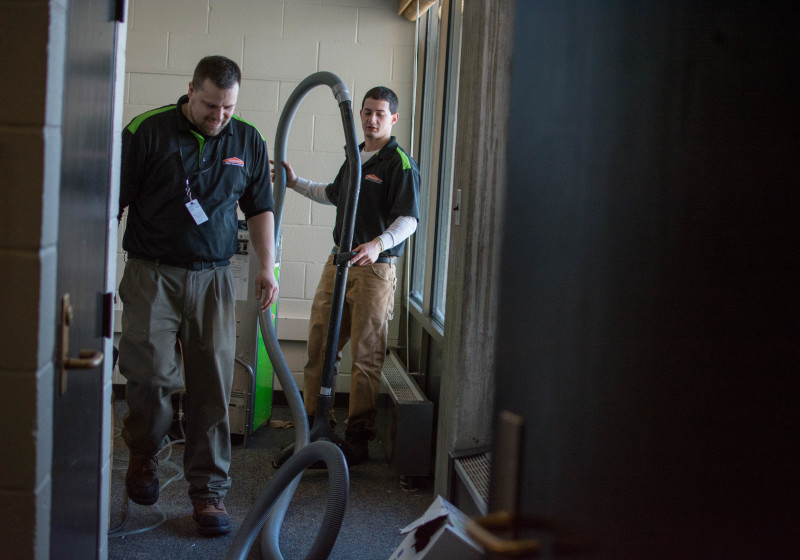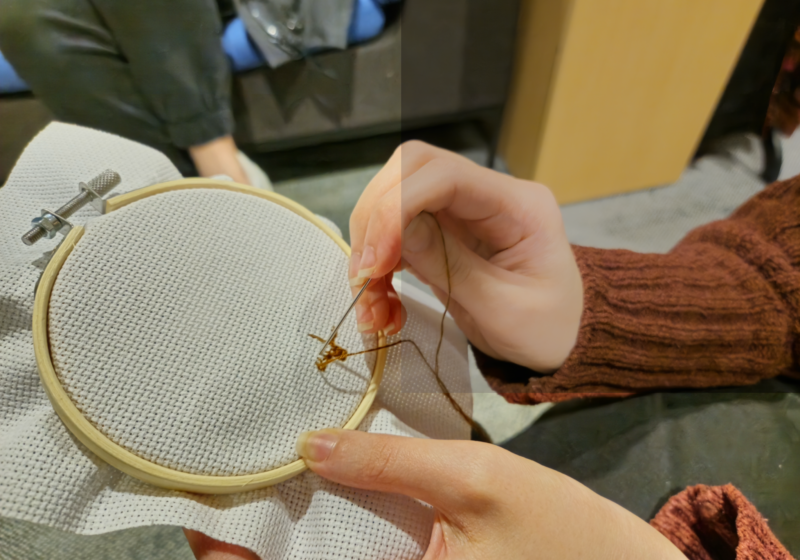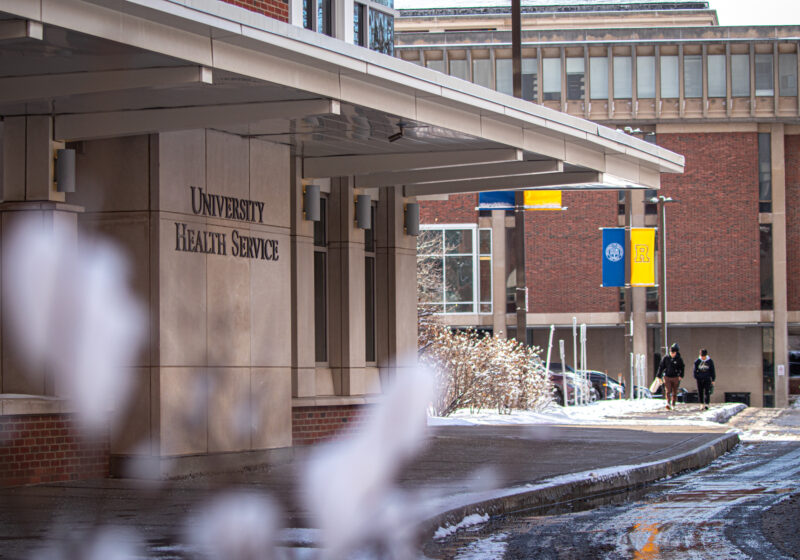While students have been vocal in their condemnation of UR’s response to last week’s Gale House flooding, the University has remained relatively silent.
The University’s public response to an open letter from the Students’ Association (SA) president, Monday’s unanimously-passed SA Senate resolution, and massive student outrage has so far amounted to just one meeting between SA President Grant Dever and Director of the Office for Residential Life and Housing Services Laurel Contomanolis.
It has not responded directly to the letter or the resolution, and students say Residential Life has yet to apologize to—or officially contact at all—Gale residents for damages incurred in the Feb. 14 flood since its initial emails about the situation last week.
Damages Done
Caused by a pipe burst in suite 430 in Gale on Valentine’s Day morning, the incident left at least 10 students with significantly damaged property and affected around 30 more, spilling through all four floors of the dormitory and many of the building’s heat sources.
The damages totaled between $4,000 and $10,000, according to estimates calculated by SA Senator Anmol Almast, who spearheaded the resolution, which was passed in a 13–0 vote during Monday’s Senate meeting and urged the administration to compensate affected students.
Contomanolis said Wednesday that damage to University property has exceeded $25,000 thus far, when asked if the University had estimated that cost.
Almast’s data indicates that three laptops were lost in the flood. Some items necessary for academic work have already been replaced.
The University made clear after the flooding that it was not liable to compensate any students for their losses, and encouraged those affected to see if their insurance could cover the costs.
Gale’s Community Advisor Dominick Schumacher said Wednesday that some students have been able to pay for their damages with their parents’ homeowner’s insurance, but “insurance deductibles make it so that even with insurance, most students or their parents have had to bite the bullet and pay out of pocket.”
Direct Response Absent
Sophomores Jien Ogawa and Brad Kaufman, who live directly beneath the source of the flood and estimated over $1,600 in damages, both said Wednesday that they had received no contact from Residential Life since the incident. Schumacher confirmed that residents had not been contacted further.
Ogawa said she has not made any progress in paying for her damages, while Kaufman said his insurance claim is being processed.
Neither Almast nor SA Senator David Stark, co-sponsor of the resolution, had been contacted by the University as of Wednesday.
SA President Grant Dever said Wednesday that he had received no direct response to his open letter, which was sent to Dean of the College Richard Feldman and Dean of Students Matthew Burns on Feb. 18.
According to emails obtained by the Campus Times, Contomanolis wrote to Dever on Monday to meet to discuss “the best way to respond to the SA’s concerns about the Gale flood.” She added that she was “just looking for a little guidance so that we can figure out the best approach to addressing the concerns.”
The two met Tuesday, Dever said. During the meeting, as in his response to Contomanolis’ original email, he said he urged the director to send a campus-wide email responding to the flood and its fallout. He described Contomanolis as “hesitant” to issue such a response.
Dever wrote in an email to Feldman and Burns after the meeting that Contomanolis “is worried that a formal response will only stir the pot more.”
Contomanolis said her reasoning for this, expressed in her conversation with Dever, was that such an email would be “too broad.”
Responding to Dever’s email, in which the president said “that the impact of [Contomanolis’] perspective not being shared, or this incident being perceived as ‘unresolved,’ ‘swept under the rug,’ etc. will be detrimental,” Feldman said the University was discussing how to best issue a response.
The two are scheduled to meet next Monday.
Trust On the Rocks
Communication—and, more broadly, trust—has become a theme in the situation, after the immediate conversation about reparations.
SA officials are concerned that the University’s decision not to reimburse affected students has undermined the student body’s faith in the administration. Students and alumni on social media have decried what they see as an instance of the University treating students as merely revenue sources.
“Unfortunately, this is an instance of poor communication by the Office for Residential Life and the University as a whole,” Stark said. “Is ResLife legally liable for these damaged laptops? Based on the housing contract, probably not. Is $4,000 a worthwhile price to pay to help restore trust in your department and your University? You bet.”
In his open letter, Dever wrote that he believes gaps in communication between UR and affected students had contributed to student distrust of the University.
“I hope that your office will take responsibility for communications related to this issue moving forward, as I believe that your office will be capable of more empathetic and compassionate communication towards those affected,” he wrote, addressing Feldman. “At the very least, these students deserve an apology.”
When asked if the University believes it is morally or ethically right to not help affected students with their damages—a common criticism in the wake of the flooding—Contomanolis said, “We are truly sorry for the loss of property for these students, recognizing that some items, including computers and electronics, are an impactful and upsetting loss.”
Residential Life remains committed to helping affected students and asks that they pass on their concerns, she added.
Both Stark and Dever were worried that alumni—especially younger ones—would be put off from donating to the University because of its handling of the flooding.
One recent alumna, Joan Marshall ‘15, wrote in a Facebook comment to SA that she lived in Gale 420 and is “sick to [her] stomach as an alum and as a person who could have potentially experienced this catastrophe while living in that building.”
Odors Gone, Water Dry
Schumacher said that Gale has dried and that dehumidifiers and fans have been removed. Only a few ceiling tiles need to be replaced, and Facilities and Services will be treating rooms with chemicals over Spring Break to ensure mold is prevented.
Despite claims from SA officials that unpleasant odors are still present in Gale, Schumacher, Ogawa, and Kaufman all said that any foul smells have dissipated.
Schumacher said the smells mostly stemmed from unwashed clothes, which he said sat wet on floors and in closets. Residential Life asked students to clean their clothes as soon as possible after the flooding, to eliminate moisture.
One student has had allergy issues since the flooding and cleanup, but Schumacher said allergic reactions have been limited to that individual. Servpro, the cleanup company brought in to deal with the crisis, treated carpets with an anti-allergen mold inhibitor.
Going Forward
In future weeks, Dever hopes to meet with affected students and ask them to evaluate the University’s eventual statement.
As for the University’s responsibility in the flooding, Contomanolis said that incidents like this are unpredictable, even though UR “performs all the needed maintenance and preventative measures that help reduce the likelihood of a pipe bursting.”
That’s why Residential Life urges students to have personal property insurance, she said.
“Again, we are here to help if students wish to discuss their specific concerns.”





